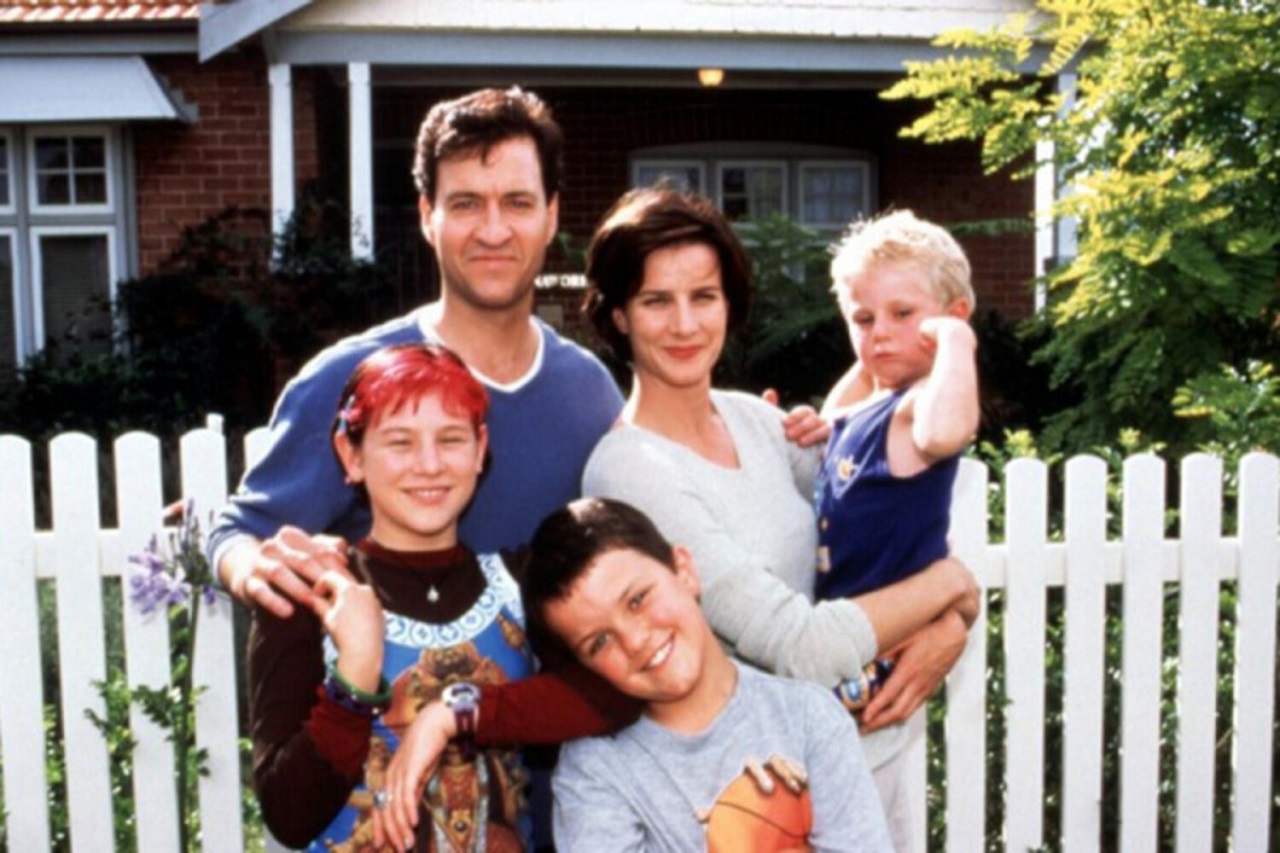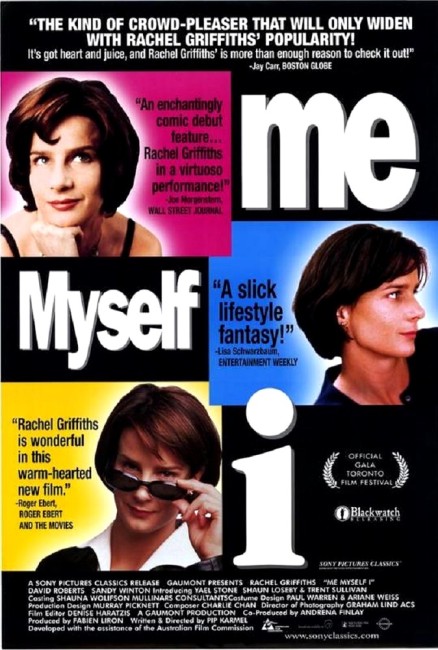Australia/France. 1999.
Crew
Director/Screenplay – Pip Karmel, Producer – Fabien Liron, Photography – Graham Lind, Music – Charlie Chan, Visual Effects/CGI – Animal Logic Film, Production Design – Murray Picknett. Production Company – Gaumont
Cast
Rachel Griffiths (Pamela Drury Dickson), David Roberts (Robert Dickson), Sandy Winton (Ben Monroe), Yael Stone (Stacy Dickson), Shaun Loseby (Douglas Dickson), Trent Sullivan (Rupert Dickson), Felix Williamson (Geoff), Rebecca Firth (Terri)
Plot
Pamela Drury is a lonely, single journalist in Sydney, Australia. She is depressed at her lack of success with men and the pressure from others around her to settle down. After falling over in the street, she suddenly finds herself in an alternate life – one that would have happened if she had married Robert Dickson thirteen years ago and where she is now a housewife with three children. Trying to adjust to this lifestyle, she soon begins to discover some of the things she has missed.
Me Myself I belongs to a modern fad of what might be termed women’s alternate life choice fantasies. This mini-genre began with Smoking/No Smoking (1993) and was thereafter colonised by the Chick Flick. Others entries among the fad have included the likes of Sliding Doors (1998), the tv movie Twice Upon a Time (1998), Twice Upon a Yesterday (1998), Passion of Mind (2000), two male versions, The Family Man (2000) and the Brazilian Possible Loves (2001), and a distaff cousin with the overrated arthouse hit Run Lola Run (1998).
All of these are fantasy films that chart different possible pathways of people’s lives and centre around the question of what would have happened if some fundamental choice had had a different outcome. The Chick Flick versions usually end up addressing the post-feminist question of choice between being single, finding fulfilled true love and the question of whether marriage and children is the be-all-and-end-all of existence. Sliding Doors was a bland Hollywoodised version that traded in a Cinderella vision of fulfilment but some of the subsequent entries such as Twice Upon a Yesterday and this have been surprisingly good. (For a more detailed overview of the genre see Alternate Timelines).
It is interesting to contrast Me Myself I to The Family Man, which told exactly the same story from a male perspective – both are films where a single person suddenly finds themselves in a life where they are married and have children. The Family Man is a fine film in completely different ways – it sentimentalises the working class lifestyle. Me Myself I‘s family is much better off financially than the one in Family Man but Me Myself I resonates with greater realism.

Me Myself I is definitely a woman’s film. No male could ever write about something like the awkwardness of a girl putting in her first tampon or a man might find in being asked to change the sheets, or derive such hilarity from the problem of inserting a diaphragm. Ultimately, Me Myself I is a film that decides that attachment and family is a good thing – one would have been intrigued to see the story that might have resulted when the married Rachel Griffiths turned up in her single counterpart’s life. Where all Sliding Doors could do is longingly wish for romantic fulfillment and a career, Me Myself I has the virtue of wry wit.
On a pure story level, Me Myself I is an absurdly simple film but the pleasure comes in the sense of humour with which Pip Karmel presents it. The film’s virtue is Karmel’s hilarious presentation of the sheer ordinariness of the situation that Rachel Griffiths finds herself in – at having to wipe her youngest son’s bottom when he goes to the toilet; her going to the supermarket and by instinct buying for only one instead of five. Some of Rachel Griffith’s expressions at her twelve year-old daughter asking “If you haven’t had your period yet, do you still have to wear a condom when you have sex?” or the deflation of her expectant expression as her husband goes to sleep disinterested in sex, are priceless.
Pip Karmel has a delightfully playful sense of humour – like the shot that cuts from Rachel Griffiths on one of her personals column dates to a pan along the floor strewn with clothing and panting on the soundtrack before anticlimactically revealing it to be a disconsolate Griffiths watching an X-rated video. There is at least one quite amazing shot with Rachel Griffiths standing in a bathtub considering dropping a hairdryer in the water, where Roberta Flack’s All By Myself comes on the soundtrack as the hairdryer twirls blow up soap suds in slow motion.
The film received an arthouse release in the USA in 2000. It came out only a couple of months before the Farrelly Brothers’ Jim Carrey comedy Me Myself and Irene (2000), causing some confusion between the two titles.
This was the only feature film directed by Pip Karmel. Elsewhere, she has written for Australian television.
(Nominee for Best Actress (Rachel Griffiths) at this site’s Best of 1999 Awards).
Trailer here


